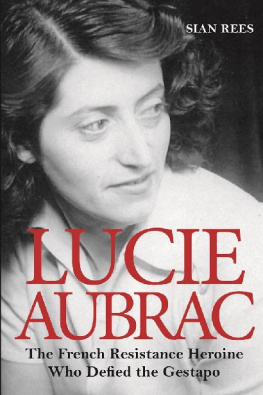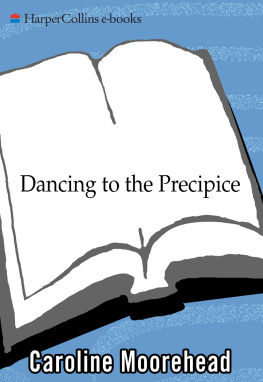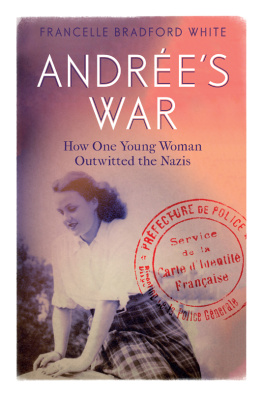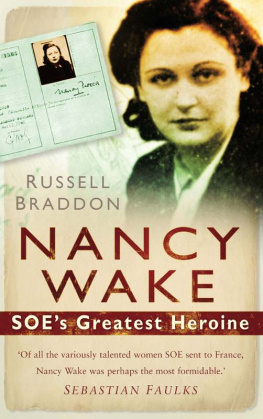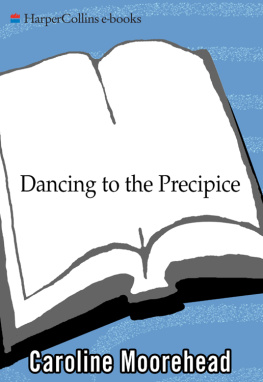Siân Rees - Lucie Aubrac: The French Resistance Heroine Who Outwitted the Gestapo
Here you can read online Siân Rees - Lucie Aubrac: The French Resistance Heroine Who Outwitted the Gestapo full text of the book (entire story) in english for free. Download pdf and epub, get meaning, cover and reviews about this ebook. year: 2016, publisher: Chicago Review Press, genre: Non-fiction. Description of the work, (preface) as well as reviews are available. Best literature library LitArk.com created for fans of good reading and offers a wide selection of genres:
Romance novel
Science fiction
Adventure
Detective
Science
History
Home and family
Prose
Art
Politics
Computer
Non-fiction
Religion
Business
Children
Humor
Choose a favorite category and find really read worthwhile books. Enjoy immersion in the world of imagination, feel the emotions of the characters or learn something new for yourself, make an fascinating discovery.
- Book:Lucie Aubrac: The French Resistance Heroine Who Outwitted the Gestapo
- Author:
- Publisher:Chicago Review Press
- Genre:
- Year:2016
- Rating:3 / 5
- Favourites:Add to favourites
- Your mark:
- 60
- 1
- 2
- 3
- 4
- 5
Lucie Aubrac: The French Resistance Heroine Who Outwitted the Gestapo: summary, description and annotation
We offer to read an annotation, description, summary or preface (depends on what the author of the book "Lucie Aubrac: The French Resistance Heroine Who Outwitted the Gestapo" wrote himself). If you haven't found the necessary information about the book — write in the comments, we will try to find it.
Siân Rees: author's other books
Who wrote Lucie Aubrac: The French Resistance Heroine Who Outwitted the Gestapo? Find out the surname, the name of the author of the book and a list of all author's works by series.
Lucie Aubrac: The French Resistance Heroine Who Outwitted the Gestapo — read online for free the complete book (whole text) full work
Below is the text of the book, divided by pages. System saving the place of the last page read, allows you to conveniently read the book "Lucie Aubrac: The French Resistance Heroine Who Outwitted the Gestapo" online for free, without having to search again every time where you left off. Put a bookmark, and you can go to the page where you finished reading at any time.
Font size:
Interval:
Bookmark:
Also by Sin Rees
The Floating Brothel: The Extraordinary Story of the Lady Julian and Its Cargo of Female Convicts Bound for Botany Bay
Sweet Water and Bitter: The Ships that Stopped the Slave Trade
The Ship Thieves: The True Tale of James Porter, Colonial Pirate
The Shadows of Elisa Lynch: How a Nineteenth-Century Irish Courtesan Became the Most Powerful Woman in Paraguay
Moll: The Life and Times of Moll Flanders

First published in Great Britain in 2015 by
Michael OMara Books Limited
9 Lion Yard
Tremadoc Road
London SW4 7NQ
Copyright Sin Rees 2015
All rights reserved. You may not copy, store, distribute, transmit, reproduce or otherwise make available this publication (or any part of it) in any form, or by any means (electronic, digital, optical, mechanical, photocopying, recording or otherwise), without the prior written permission of the publisher. Any person who does any unauthorized act in relation to this publication may be liable to criminal prosecution and civil claims for damages.
A CIP catalogue record for this book is available from the British Library.
ISBN: 978-1-78243-387-3 in hardback print format
ISBN: 978-1-78243-390-3 in e-book format
www.mombooks.com
Extracts reprinted from Outwitting the Gestapo by Lucie Aubrac, translated by Konrad Bieber with the assistance of Betsy Wing, by permission of the University of Nebraska Press. Originally published as Ils partiront dans livresse. Copyright 1984 Editions du Seuil. English translation copyright 1993 by The University of Nebraska Press.
Cover design and typeset by Billy Waqar
Cover image courtesy of Getty Images
Designed by Kay Hayden
CONTENTS
IN THE COLD dawn of 9 February 1944, Flight Lieutenant Affleck of the RAF landed his heavy Hudson aircraft a few miles from London. Touchdown was fraught. Mud from the Jura mountains of eastern France had coated the wheels of the plane and frozen, although Affleck kept the fact from his four exhausted passengers. John Brough, a downed RAF pilot rescued by the French Resistance, alighted first. Next came twenty-nine-year-old Raymond Aubrac, wounded, grieving and carrying his sleeping two-year-old son in his arms. Finally, a womans swollen, awkward figure appeared, wrapped in coats, scarves and blankets against the bitter wind, and the ground crew had their first, eagerly awaited glimpse of Lucie Aubrac, eight months pregnant, who had sprung her husband from Gestapo custody five months earlier and had been on the run ever since.
The following night Radio Londres, the BBC French-language broadcast, announced the Aubracs safe arrival. A few weeks ago, the speaker declared, Lucie Aubrac was the leader of a 12-member action group, who seized 14 patriots from the claws of the Gestapo. Her story illuminated:
Aubrac was the last, and the most enduring, of Lucies many identities: the resistance name taken by her husband in 1942, retained to protect relatives in Nazi hands and eventually adopted as the familys legal name in 1950. Every French schoolchild knows it, and the legend of heroism attached to it. Over one hundred French schools, nurseries, hospitals and retirement homes are called after the Aubracs, both wife and husband were given state funerals and Lucie was recently mooted for pantheonization, the transfer of remains into the Panthon in Paris, where France honours its best and boldest. The Aubracs upheld French honour at a bleak time in their countrys history, but their courage under Vichy and during the Nazi Occupation was only one episode in their long lives. There is, however, shade as well as light in the Aubracs story, for their trajectory from freedom fighters to revered senior citizens was not a smooth one.
Still young in 1945, both Lucie and Raymond Aubrac developed successful post-war careers, revisiting their wartime stories only when they retired in the 1970s. It was ultimately Frances growing fascination with the Dark Years that propelled Lucie back into the spotlight thirty years after the events which had first made her famous, when she found herself sought by documentary-makers, historians and schoolteachers anxious for their pupils to hear first-hand testimony of resistance. But as new evidence of wrongdoing also began to emerge, the comforting myths of mass resistance which had sustained post-war France began to fall apart, and even celebrated rsistants such as the Aubracs came under hostile scrutiny.
The Gestapo officer who had tortured Raymond Aubrac in 1943 was Klaus Barbie, known as the Butcher of Lyon. Extradited to France forty years later, he tortured the Aubracs all over again with accusations of treachery and betrayal. A sordid episode of resentment, jealousy, cowardice and opportunism saw the elderly community of former rsistants turn on each other, and on the Aubracs. But the couples legend survived, despite a beating at the hands of the press and people they had believed to be comrades in arms, and by the turn of the century they were again considered national heroes even if the polluted ripple of accusation and counter-accusation has never quite died. Their status as public figures restored, both found their opinions sought on contemporary as much as historical events: international politics and the growing discourse of human rights; the rise of religious fundamentalism and new types of totalitarian rule.
Lucie died in 2007, and Raymond was buried next to his adored wife five years later. Very few men or women with first-hand testimony of the Occupation now survive, but Frances fascination with its own wartime self has continued even as that period retreats into history. Researchers have continued to uncover evidence of both heroism and treachery, and popular and academic focus has shifted with the generations: an emphasis on Resistance as the central element of the Occupation gave way to one on the deportation of Jews; investigations into deportation opened into wider research into collaboration, first political and then in all the grey areas inhabited by people living everyday lives in extraordinary circumstances; a narrative of united national resistance emerged to rival early claims by the Communist Party that it had led anti-Nazi opposition; that new narrative itself was then subsumed in an examination of the reaction of individuals; military history gave way to cultural history, cultural history to psychological examination, the role of men to that of women. But when it seemed that the Aubracs biography must, surely, be written the march from womb to tomb over, wartime and other archives excavated to exhaustion, the familiar details examined under each new lens new light was suddenly shed on Lucie. The smoking gun threatened by Barbie in the 1980s was never fired: no convincing proof of collaboration or betrayal has ever been found. Rather, archival investigation after her death revealed a more enigmatic flaw, and one which fits the interests of our generation as much as tales of derring-do and treachery fit the preoccupations of hers: a flaw rooted not in actions, but in character the individual, unrepeatable blend of circumstance, childhood, chance and neuropsychology which created the person who became Lucie Aubrac. This book tells the story of that creation.
ALL HER LIFE Lucie Aubrac was a storyteller, and her first and most enduring stories were spun around her childhood. At first, it was merely the place and people she was determined to leave behind. Later, she reimagined it as a springboard and a support and finally, when she talked of it in her old age, it was a receding background against which a few recollections still flared like matches struck in the dark: the places and people which had marked her, and the signposts she had followed. Some of these remained constant in the narratives she created around herself. Ambition was one, and rebellion, and the fierce determination to seek and seize happiness. So were love, friendship and the compulsion to name and fight injustice. All of these coloured the way in which she lived, moulded and told her life.
Next pageFont size:
Interval:
Bookmark:
Similar books «Lucie Aubrac: The French Resistance Heroine Who Outwitted the Gestapo»
Look at similar books to Lucie Aubrac: The French Resistance Heroine Who Outwitted the Gestapo. We have selected literature similar in name and meaning in the hope of providing readers with more options to find new, interesting, not yet read works.
Discussion, reviews of the book Lucie Aubrac: The French Resistance Heroine Who Outwitted the Gestapo and just readers' own opinions. Leave your comments, write what you think about the work, its meaning or the main characters. Specify what exactly you liked and what you didn't like, and why you think so.

